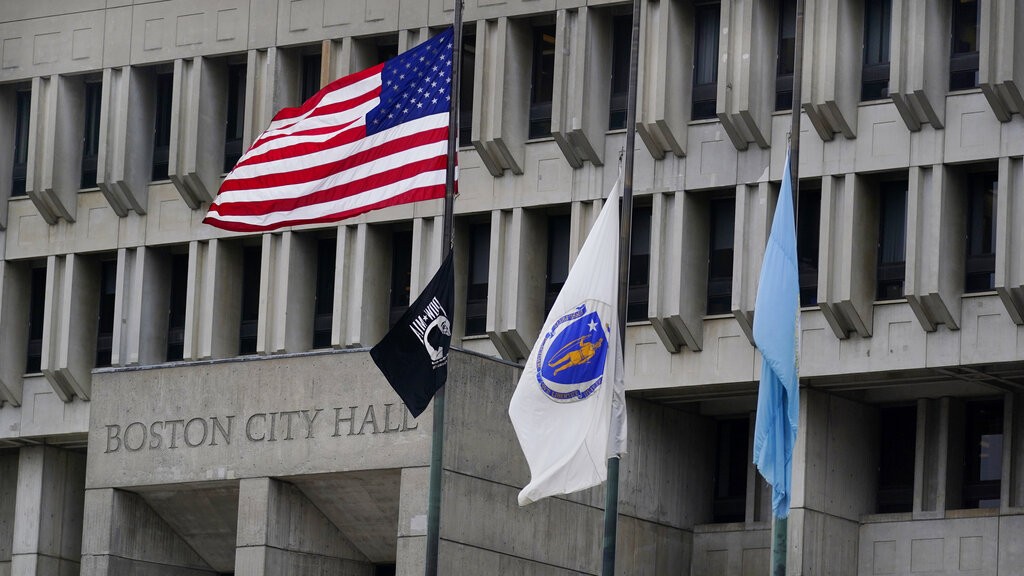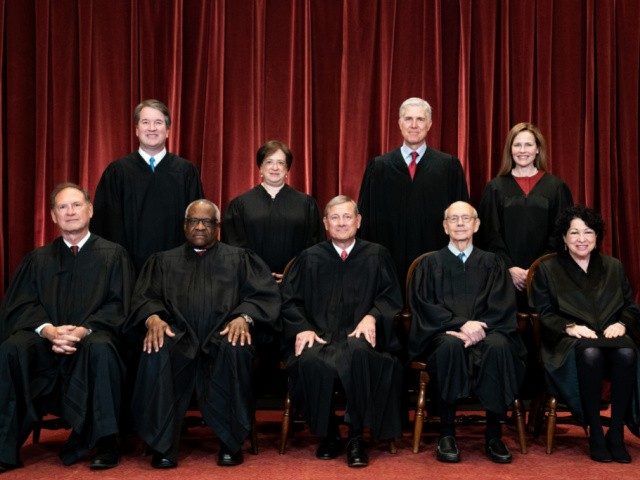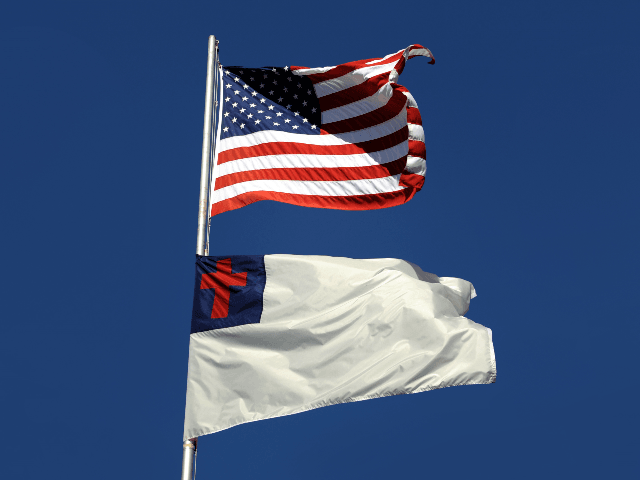The Supreme Court unanimously ruled against the City of Boston on Monday for denying a group the right to fly the Christian Flag outside the entrance of Boston City Hall.
In a sweeping victory for religious liberty, the justices ruled that Boston’s flag-raising program does not express government speech, meaning Boston’s refusal to let petitioners fly their flag violated the Free Speech Clause of the First Amendment.
“When the government encourages diverse expression— say, by creating a forum for debate—the First Amendment prevents it from discriminating against speakers based on their viewpoint. But when the government speaks for itself, the First Amendment does not demand airtime for all views,” Justice Stephen Breyer wrote in his opinion for the Court, which was joined by Chief Justice John Roberts and Justices Sonia Sotomayor, Elena Kagan, Brett Kavanaugh, and Amy Coney Barrett.
“We conclude that, on balance, Boston did not make the raising and flying of private groups’ flags a form of government speech. That means, in turn, that Boston’s refusal to let Shurtleff and Camp Constitution raise their flag based on its religious viewpoint “abridg[ed]” their “freedom of speech,” Breyer continued.
The case surrounds a 2017 incident in which Harold Shurtleff, the director of an organization called Camp Constitution, asked to hold an event at the City Hall Plaza to celebrate the civic and social contributions of the Christian community. As part of the ceremony, Shurtleff asked the city if the group could raise the Christian flag —Boston’s Property Management Department commissioner denied the request, citing concerns that flying a religious flag at City Hall would violate the Establishment Clause and would constitute a government endorsement of religion. The city told Shurtleff the group could still hold their event at the plaza but could not raise their flag, to which Shurtleff responded by suing the city, alleging a violation of the First Amendment’s Free Speech Clause.
For context, the city has three flagpoles outside of Boston City Hall; usually, the city flies the America flag, the flag of the Commonwealth of Massachusetts, and the city’s own flag from the third pole. The Court noted in its decision that for years, the city allowed groups to hold ceremonies at the plaza “during which participants may hoist a flag of their choosing on the third pole in place of the city’s flag.” Between 2005 and 2017, Boston approved the raising of roughly 50 flags for 284 ceremonies, including flags for other countries and the Pride Flag. The city had never rejected a flag-raising application until Shurtleff’s request to raise the Christian Flag.

The American flag, the Commonwealth of Massachusetts flag, and the City of Boston flag, from left, fly outside Boston City Hall, Monday, May 2, 2022, in Boston. (AP Photo/Charles Krupa)
Breyer wrote that because City Hall Plaza is available to the public for events, the plaza is a “public forum.” Additionally, he said the city’s overall practice of approving all flag-raising events besides Shurtleff’s “is the most salient feature of this case.”
“Boston could easily have done more to make clear it wished to speak for itself by raising flags. Other cities’ flag-flying policies support our conclusion. The City of San Jose, California, for example, provides in writing that its “‘flagpoles are not intended to serve as a forum for free expression by the public,’” and lists approved flags that may be flown “‘as an expression of the City’s official sentiments,’” he wrote, adding that nothing prevents Boston from changing its policy going forward.
“Here, Boston concedes that it denied Shurtleff ’s request solely because the Christian flag he asked to raise “promot[ed] a specific religion.” Under our precedents, and in view of our government-speech holding here, that refusal discriminated based on religious viewpoint and violated the Free Speech Clause,” he said, before ultimately reversing the “contrary judgment” of the U.S. Court of Appeals for the First Circuit and remanding the case for further proceedings.
In his opinion, Breyer used government-speech analysis as a test, first looking at the history of government flag-flying, then examining the details of Boston’s specific flag-flying program. Next, he considered the public’s view of the speech, and then looked at Boston’s role in moderating which flags were raised and what messages were sent to the public.
Justice Samuel Alito wrote a concurring opinion joined by Justices Clarence Thomas and Neil Gorsuch, agreeing with the Court’s overall decision, but disagreeing with Breyer’s use of government speech analysis as a blanket test for Establishment Clause violations.
“…I cannot go along with the Court’s decision to analyze this case in terms of the triad of factors—history, the public’s perception of who is speaking, and the extent to which the government has exercised control over speech As the Court now recognizes, those cases did not set forth a test that always and everywhere applies when the government claims that its actions are immune to First Amendment challenge under the government-speech doctrine,” Alito wrote. “And treating those factors as a test obscures the real question in government-speech cases: whether the government is speaking instead of regulating private expression.”
Alito argued that to “prevent the government-speech doctrine from being used as a cover for censorship, courts must focus on the identity of the speaker.”
“The ultimate question is whether the government is actually expressing its own views or the real speaker is a private party and the government is surreptitiously engaged in the “regulation of private speech,”’ he said. “Indeed, excluding religious messages from public forums that are open to other viewpoints is a “denial of the right of free speech” indicating “hostility to religion” that would “undermine the very neutrality the Establishment Clause requires.”’
Gorsuch penned a concurring opinion of his own, which Thomas also joined, slamming Boston’s use of the Lemon Test to defend the city’s discriminatory behavior. Gorsuch argued the Lemon Test, created in 1971 to test if government action is coercing religious conduct, “sought to devise a one-size-fits-all test for resolving Establishment Clause disputes” and has been exposed as “an anomaly and a mistake” not applied in “nearly two decades.”
“Instead of bringing clarity to the area, Lemon produced only chaos. In time, this Court came to recognize these problems, abandoned Lemon, and returned to a more humble jurisprudence centered on the Constitution’s original meaning. Yet in this case, the city chose to follow Lemon anyway. It proved a costly decision, and Boston’s travails supply a cautionary tale for other localities and lower courts,” Gorsuch contended.
“To the extent this is why some still invoke Lemon today, it reflects poorly on us all. Through history, the suppression of unpopular religious speech and exercise has been among the favorite tools of petty tyrants,” he continued.
Kavanaugh wrote his own, much shorter concurring opinion, in which he boiled down the case to Boston’s misunderstanding of the Establishment Clause.
“So Boston granted requests to fly a variety of secular flags, but denied a request to fly a religious flag. As this Court has repeatedly made clear, however, a government does not violate the Establishment Clause merely because it treats religious persons, organizations, and speech equally with secular persons, organizations, and speech in public programs, benefits, facilities, and the like,” Kavanaugh wrote. “On the contrary, a government violates the Constitution when (as here) it excludes religious persons, organizations, or speech because of religion from public programs, benefits, facilities, and the like.”
“Under the Constitution, a government may not treat religious persons, religious organizations, or religious speech as second-class,” he concluded.
The case is Shurtleff v. Boston, No. 20-1800 in the Supreme Court of the United States.
Katherine Hamilton is a political reporter for Breitbart News. You can follow her on Twitter.


COMMENTS
Please let us know if you're having issues with commenting.